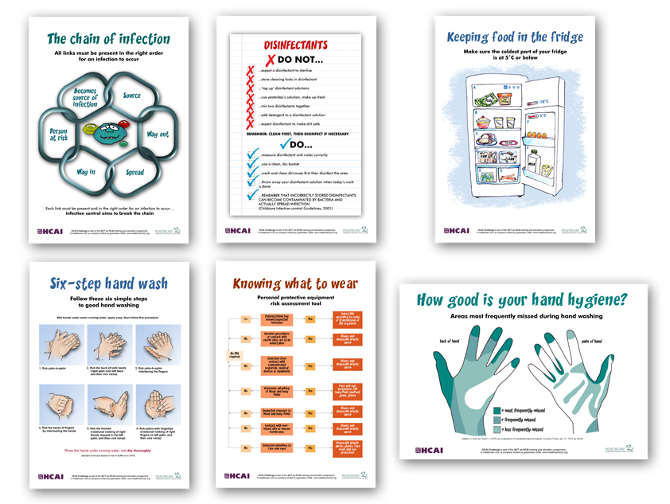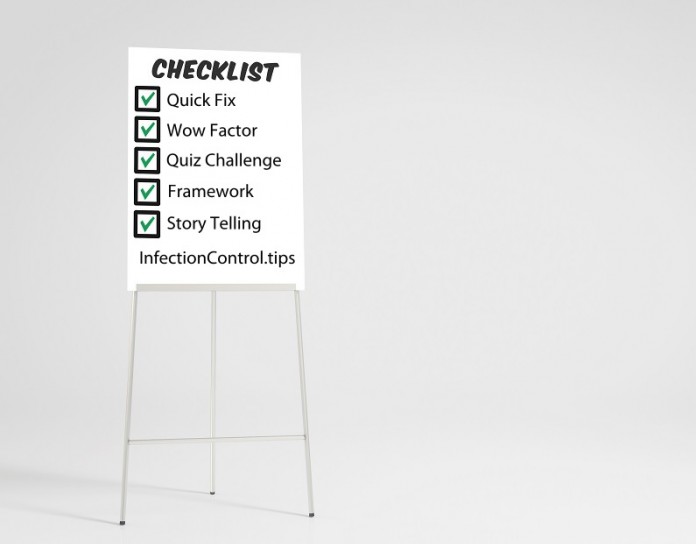Abstract:
Achieving staff engagement with mandatory training topics is a challenge for many organisations. Too often, staff will attend events for the ‘tick in the box’, without learning anything new, or feeling motivated to do anything differently. The need to meet essential standards of quality and safety is about compliance, but compliance must encompass people taking the classroom theory and putting it into practice. After all, regulators don’t just check training attendance records; they talk with staff too! Fortunately, there are some simple techniques we can use in the training room to help this transition.
Main Article:
At some point, we have all sat through those long lectures and back-to-back presentations that are supposed to make us fit-to-practice. Even worse, we have skimmed through pages of materials wondering when we’ll reach the finish of the seemingly never-ending training. With everything we know about how people learn best, why do we so often persist with pushing people through this experience? This may ‘tick the box’ for regulators, but does little or nothing to help us bridge the theory/practice divide. So, when time and budget are limited, what can we do to improve the experience for learners, and for the trainer?
Quick fix versus the wow factor
The first decision is how much should be changed about your current approach to mandatory training. Often, there will be limiting factors most likely related to time and cost, For example, the size and format of the training venue; the experience and confidence of the trainer; the heritage and culture of the organisation; and, the level of support from senior leaders.
Crossing the theory practice divide
Within the healthcare setting, any organisation delivering care is required to provide essential training to meet standards for quality and safety. A wide mix of health and social care staff need to be aware of, and understand, key health and social care procedures including: Consent and Understanding Mental Capacity; Nutrition and Hydration; Food Hygiene; End of Life Care; Records Management and Confidentiality; and, of course, Infection Prevention and Control.
In the UK, there are serious legal implications for failing to comply with The Health and Social Care (Safety and Quality) Act, and the accompanying Code of Practice for the prevention and control of infections. Regulators have significant penal powers, and patients deserve the best of care, so there are big risks for not investing in essential training for staff. If the risk indicators below sound familiar, then it could be time to take a look at your training strategy and delivery plan.
If these risk indicators sound familiar, then it could be time to take a look at your training strategy and delivery plan
- Key policies and procedures are in place, but not applied consistently in practice.
- There are signs of disengagement through ‘did not attend’ records, and mediocre training evaluations.
- Staff have a mixed awareness and understanding of the need to meet requirements for high-quality care.
- A recent inspection has highlighted non-compliance and areas for action.
The quick fix
The good news is that improving your mandatory training can be an evolution rather than a revolution. There are many influences on learning behaviour and learner experience, so most organisations find it easy to make some simple adjustments immediately. A good place to look for how the current training (learning experience) is being received, is the training evaluation form. A look with fresh eyes might reveal some ‘quick fix’ and low cost solutions.
The wow factor
Sometimes, small changes aren’t enough though. Sometimes, we need something to grab staff attention and send a motivational wave through the organisation. The training event itself becomes the kick-start for change.
Sometimes, we need something to grab staff attention and send a motivational wave through the organisation
One example of putting the wow factor into practice was a mandatory infection control training programme converted into an action-based learning experience. The format is simple to follow; but the impact was immense.
Infection control pub quiz challenge
This health provider needed to revitalise its mandatory training. They needed a unique event to create energy, enthusiasm and post-session action. In particular, there was a challenge around how to engage healthcare assistants and non-qualified staff with a topic that they saw as irrelevant and uninteresting.
Working with the Lead Nurse and Infection Control team, four objectives were set for this training:
- Raise awareness of key infection control principles
- Redress the myths and misunderstandings around healthcare associated infections
- Provide opportunity for staff to practise their handwashing technique
- Make the training fun
A flexible framework and fascinating facts
Based on a pub quiz format, Healthcare Associated Infections Challenge was a high-impact, action-based learning experience designed as a team quiz. In addition to the main quiz activity, the session included a UV glow box demonstration for checking handwashing technique, and an open question and answer session for addressing specific needs.

Healthcare Associated Infections Challenge used a universally recognised quiz format, designed and branded to provide visual impact, with educational content mapped against current evidence and standards of quality and safety

The session included a take-away book and a variety of infection control posters and leaflets for sharing with colleagues and families
Although initially developed for infection control, the quiz format also provided the organisation with a framework suited to the delivery of any content or topic.
Infection control story telling
The fun element was a main focus of the underlying educational design, and the quiz purposefully used several engagement devices to draw people into the topic and make infection control fascinating! The event included ‘story telling’ around significant infection control trail blazers, and anecdotes about interesting and quirky events, such as the day in 1854 when Dr. John Snow removed the handle from a water pump in London to stop an Asiatic cholera outbreak.
The quiz purposefully used several engagement devices
to draw people into the topic
Healthcare Associated Infections Challenge created an organisational buzz. It became a format that many other healthcare organisations adopted. It generated emotion and created an experience that people remembered and acted upon.
High-quality care starts in the training room
There is a need for all health and social care organisations to deliver fundamental standards of care, and to offer a programme of education to support health and social care workers in achieving this. We should not under-estimate how much mandatory training matters, and how it should be just one element in a wider programme of learning and development that leads to high-quality responsive care.












